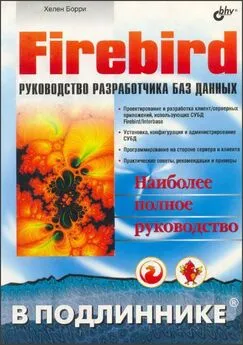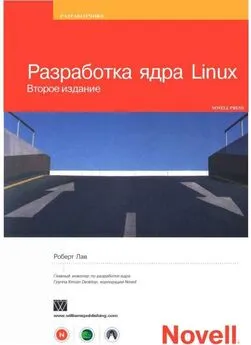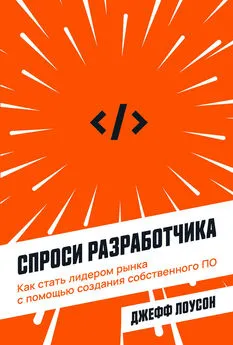Ори Померанц - Энциклопедия разработчика модулей ядра Linux
- Название:Энциклопедия разработчика модулей ядра Linux
- Автор:
- Жанр:
- Издательство:неизвестно
- Год:неизвестен
- ISBN:нет данных
- Рейтинг:
- Избранное:Добавить в избранное
-
Отзывы:
-
Ваша оценка:
Ори Померанц - Энциклопедия разработчика модулей ядра Linux краткое содержание
Linux Kernel Module Programming Guide свободная книга; Вы можете воспроизводить и/или изменять ее в соответствии с версией 2 (или, в вашем случае, любой более поздней версией) GNU General Public License, опубликованной Free Software Foundation. Версия 2 поставляется с этим документом в Приложении E.
Эта книга распространяется в надежде, что будет полезна, но без какой-либо гарантии; даже без подразумеваемой гарантии высокого спроса или пригодности какой-либо для специфической цели.
Автор поощряет широкое распространение этой книги для персонального или коммерческого использования, если вышеупомянутое примечание относительно авторского права остается неповрежденным, и распространитель твердо придерживается условий GNU General Public License (см. Приложение E). Вы можете копировать и распространять эту книгу бесплатно или для получения прибыли. Никакое явное разрешение не требуется от автора для воспроизводства этой книги в любой среде, физической или электронной.
Обратите внимание, производные работы и переводы этого документа должны быть помещены согласно GNU General Public License, и первоначальное примечание относительно авторского права должно остаться неповрежденным. Если Вы пожертвовали новый материал этой книге, Вы должны сделать исходный текст доступным для ваших изменений. Пожалуйста делайте изменения и модификации, доступные непосредственно поддерживающему данный проект Ori Pomerantz. Он объединит модификации и обеспечит непротиворечивость изменений для всего Linux сообщества.
Если Вы планируете издавать и распространять эту книгу коммерчески, пожертвования, лицензионные платежи, и/или напечатанные копии будут высоко оценены автором и Linux Documentation Project (LDP). Содействие таким образом показывает вашу поддержку свободного программного обеспечения и Linux Documentation Project. Если Вы имеете вопросы или комментарии, пожалуйста войдите в контакт с автором по адресу, приведенному выше.
Энциклопедия разработчика модулей ядра Linux - читать онлайн бесплатно полную версию (весь текст целиком)
Интервал:
Закладка:
/* procfs.c - create a "file" in /proc, which allows
* both input and output.
*/
/* Copyright (C) 1998-1999 by Ori Pomerantz */
/* The necessary header files */
/* Standard in kernel modules */
#include /* We're doing kernel work */
#include /* Specifically, a module */
/* Deal with CONFIG_MODVERSIONS */
#if CONFIG_MODVERSIONS==1
#define MODVERSIONS
#include
#endif
/* Necessary because we use proc fs */
#include
/* In 2.2.3 /usr/include/linux/version.h includes a
* macro for this, but 2.0.35 doesn't - so I add it
* here if necessary. */
#ifndef KERNEL_VERSION
#define KERNEL_VERSION(a,b,c) ((a)*65536+(b)*256+(c))
#endif
#if LINUX_VERSION_CODE >= KERNEL_VERSION(2,2,0)
#include /* for get_user and put_user */
#endif
/* The module's file functions ********************** */
/* Here we keep the last message received, to prove
* that we can process our input */
#define MESSAGE_LENGTH 80
static char Message[MESSAGE_LENGTH];
/* Since we use the file operations struct, we can't
* use the special proc output provisions - we have to
* use a standard read function, which is this function */
#if LINUX_VERSION_CODE >= KERNEL_VERSION(2,2,0)
static ssize_t module_output(
struct file *file, /* The file read */
char *buf, /* The buffer to put data to (in the user segment) */
size_t len, /* The length of the buffer */
loff_t *offset) /* Offset in the file - ignore */
#else
static int module_output(
struct inode *inode, /* The inode read */
struct file *file, /* The file read */
char *buf, /* The buffer to put data to (in the user segment) */
int len) /* The length of the buffer */
#endif
{
static int finished = 0;
int i;
char message[MESSAGE_LENGTH+30];
/* We return 0 to indicate end of file, that we have
* no more information. Otherwise, processes will
* continue to read from us in an endless loop. */
if (finished) {
finished = 0;
return 0;
}
/* We use put_user to copy the string from the kernel's
* memory segment to the memory segment of the process
* that called us. get_user, BTW, is
* used for the reverse. */
sprintf(message, "Last input:%s", Message);
for(i=0; i
/* Notice, we assume here that the size of the message
* is below len, or it will be received cut. In a real
* life situation, if the size of the message is less
* than len then we'd return len and on the second call
* start filling the buffer with the len+1'th byte of the message. */
finished = 1;
return i; /* Return the number of bytes "read" */
}
/* This function receives input from the user when the
* user writes to the /proc file. */
#if LINUX_VERSION_CODE >= KERNEL_VERSION(2,2,0)
static ssize_t module_input(
struct file *file, /* The file itself */
const char *buf, /* The buffer with input */
size_t length, /* The buffer's length */
loff_t *offset) /* offset to file - ignore */
#else
static int module_input(
struct inode *inode, /* The file's inode */
struct file *file, /* The file itself */
const char *buf, /* The buffer with the input */
int length) /* The buffer's length */
#endif
{
int i;
/* Put the input into Message, where module_output will later be able to use it */
for (i=0; i
#if LINUX_VERSION_CODE >= KERNEL_VERSION(2,2,0)
get_user(Message[i], buf+i);
/* In version 2.2 the semantics of get_user changed,
* it not longer returns a character, but expects a
* variable to fill up as its first argument and a
* user segment pointer to fill it from as the its second.
*
* The reason for this change is that the version 2.2
* get_user can also read an short or an int. The way
* it knows the type of the variable it should read
* is by using sizeof, and for that it needs the
* variable itself. */
#else
Message[i] = get_user(buf+i);
#endif
Message[i] = '\0'; /* we want a standard, zero terminated string */
/* We need to return the number of input characters used */
return i;
}
/* This function decides whether to allow an operation
* (return zero) or not allow it (return a non-zero
* which indicates why it is not allowed).
*
* The operation can be one of the following values:
* 0 - Execute (run the "file" - meaningless in our case)
* 2 - Write (input to the kernel module)
* 4 - Read (output from the kernel module)
*
* This is the real function that checks file
* permissions. The permissions returned by ls -l are
* for reference only, and can be overridden here. */
static int module_permission(struct inode *inode, int op) {
/* We allow everybody to read from our module, but only root (uid 0) may write to it */
if (op == 4 || (op == 2 && current->euid == 0)) return 0;
/* If it's anything else, access is denied */
return -EACCES;
}
/* The file is opened - we don't really care about
* that, but it does mean we need to increment the
* module's reference count. */
int module_open(struct inode *inode, struct file *file) {
MOD_INC_USE_COUNT;
return 0;
}
/* The file is closed - again, interesting only because of the reference count. */
#if LINUX_VERSION_CODE >= KERNEL_VERSION(2,2,0)
int module_close(struct inode *inode, struct file *file)
#else
void module_close(struct inode *inode, struct file *file)
#endif
{
MOD_DEC_USE_COUNT;
#if LINUX_VERSION_CODE >= KERNEL_VERSION(2,2,0)
return 0; /* success */
#endif
}
/* Structures to register as the /proc file, with
* pointers to all the relevant functions. ********** */
/* File operations for our proc file. This is where we
* place pointers to all the functions called when
* somebody tries to do something to our file. NULL
* means we don't want to deal with something. */
static struct file_operations File_Ops_4_Our_Proc_File = {
NULL, /* lseek */
module_output, /* "read" from the file */
module_input, /* "write" to the file */
NULL, /* readdir */
NULL, /* select */
NULL, /* ioctl */
NULL, /* mmap */
module_open, /* Somebody opened the file */
#if LINUX_VERSION_CODE >= KERNEL_VERSION(2,2,0)
NULL, /* flush, added here in version 2.2 */
#endif
module_close, /* Somebody closed the file */
/* etc. etc. etc. (they are all given in
* /usr/include/linux/fs.h). Since we don't put
* anything here, the system will keep the default
* data, which in Unix is zeros (NULLs when taken as pointers). */
};
/* Inode operations for our proc file. We need it so
* we'll have some place to specify the file operations
* structure we want to use, and the function we use for
* permissions. It's also possible to specify functions
* to be called for anything else which could be done to
* an inode (although we don't bother, we just put NULL). */
static struct inode_operations Inode_Ops_4_Our_Proc_File = {
&File_Ops_4_Our_Proc_File,
NULL, /* create */
NULL, /* lookup */
NULL, /* link */
NULL, /* unlink */
NULL, /* symlink */
NULL, /* mkdir */
NULL, /* rmdir */
NULL, /* mknod */
NULL, /* rename */
NULL, /* readlink */
NULL, /* follow_link */
NULL, /* readpage */
NULL, /* writepage */
NULL, /* bmap */
NULL, /* truncate */
module_permission /* check for permissions */
};
/* Directory entry */
static struct proc_dir_entry Our_Proc_File = {
0, /* Inode number - ignore, it will be filled by proc_register[_dynamic] */
7, /* Length of the file name */
"rw_test", /* The file name */
S_IFREG | S_IRUGO | S_IWUSR,
/* File mode - this is a regular file which
* can be read by its owner, its group, and everybody
* else. Also, its owner can write to it.
*
* Actually, this field is just for reference, it's
* module_permission that does the actual check. It
* could use this field, but in our implementation it
* doesn't, for simplicity. */
1, /* Number of links (directories where the file is referenced) */
0, 0, /* The uid and gid for the file - we give it to root */
80, /* The size of the file reported by ls. */
&Inode_Ops_4_Our_Proc_File,
/* A pointer to the inode structure for
* the file, if we need it. In our case we
* do, because we need a write function. */
NULL
/* The read function for the file. Irrelevant,
* because we put it in the inode structure above */
Интервал:
Закладка:





